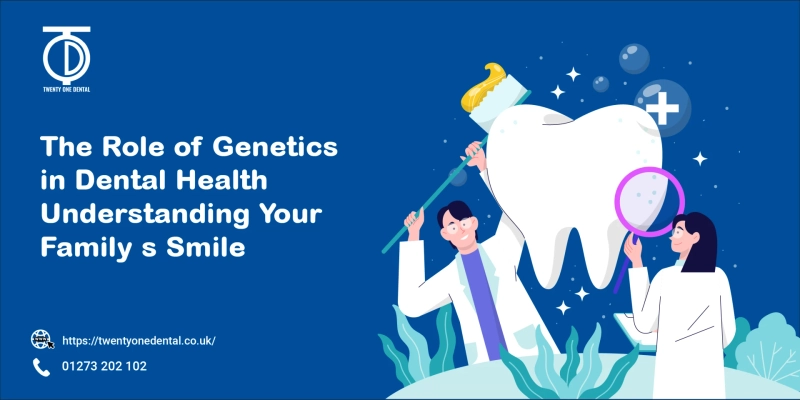Introduction
The health of your teeth is an essential component of overall well-being, with an intriguing interplay of genetics and environmental factors that affect the health of our gums and teeth. While flossing, brushing, and regular Hove dental clinic exams are generally recommended, the underlying genetic blueprint passed down from our ancestors also affects the condition of our mouth. This article will examine the intricate links between the genetics of dental health and our own and how our family's teeth are affected by the genes we inherit and provide insight into ways to enhance oral care practices that are based on the genetics of our predispositions.
The Genetic Framework of Dental Traits
Our genetic makeup is the basis for the development of various dental characteristics, ranging from tooth size and shape to the thickness of the enamel and the health of our gums. The researchers have pinpointed specific genes responsible for these characteristics, revealing the intricate role of genes in oral health outcomes.
Mendelian and Complex Traits
Dental characteristics can be classified broadly as Mendelian and complex characteristics. Mendelian traits are controlled by one gene and show regular inheritance patterns. Examples of Mendelian characteristics include Amelogenesis Imperfecta, which impacts enamel development, and dentinogenesis imperfecta, which affects dentine formation. These conditions illustrate the direct effects of specific genetic variations on dental health.
On the contrary, complex characteristics result from the interplay of many genes and environmental influences. Dental issues like gum disease, cavities, and malocclusion are all in this category. While genetics significantly influence susceptibility to these issues, lifestyle and dental hygiene practices have a considerable impact.
Genetic Predisposition to Dental Diseases
The complex relationship between dental health and genetics has caught the attention of researchers across the globe. Through studying families with a history of dental problems, researchers have discovered valuable information about the genetic elements that cause dental health problems.
The Link Between Genetics and Tooth Decay
If your family is prone to a background of tooth decay, Your genetic makeup could make you susceptible to weakening enamel or a lower capacity to neutralize acids created by bacteria. Awareness of this genetic vulnerability allows people to take specific preventive measures, for example, applying fluoride toothpaste or healthy diets that are devoid of sugary foods.
Genetic Variants and Gum Disease
Gum or periodontal disease is a different disease influenced by genetics. Certain genetic variations increase the risk of infections and inflammation and are significant elements in the development of gum diseases. Regular dental cleanings, good dental hygiene techniques, and awareness of genetics reduce the chance of developing gum disease.
Tailoring Oral Care for Genetic Benefits
As genetic research grows, the capability to tailor oral care methods by individual genetic profiles is a breakthrough advancement.
Genetic Testing for Personalized Care
The genetic testing process is the genesis of this revolutionary technology. By studying a person's DNA, it's possible to pinpoint genetic markers associated with dental characteristics and susceptibility to disease. With this information, Dentists in hove can create personalized treatment plans that meet every person's requirements.
Precision Dentistry: Merging Genetics and Technology
Precision dentistry is a new field that integrates genetic information and advanced dental technologies. This method, from orthodontics to therapeutic treatments, ensures the treatment plan is adapted to the individual's unique genetic profile. By considering genetic factors, dentists can improve the outcomes of treatments and limit the risk of problems.
The Future of Dental Health: Genetics and Innovation
The dental health horizon technology holds exciting possibilities in harnessing genetics' power to improve oral care quality.
Gene-Based Therapies
Researchers are researching gene-based therapies that address specific dental problems at the root of their sources. This revolutionary approach may change how dental issues are treated, like enamel problems and genetic predispositions to certain conditions.
Early Detection and Intervention
Understanding the genetic causes of disorders like jaw disorders and cleft palate offers the possibility of early detection and treatment. If they can identify these genetic markers, health experts can provide timely therapies that significantly improve the living quality.
Conclusion
In the intricate web of oral health, genetics emerges as a central thread interwoven with how we live and the quality of care provided by professionals. Although our genetic makeup can predispose us to specific ailments, it's not the only factor that determines our dental fates. With the help of gene knowledge and customized treatment strategies, we can actively influence how our smiles and families.
It's crucial to understand that a healthy smile results from both inheritances through genetics and the deliberate effort we put into our dental health. By embracing genetic knowledge as well as working with dental professionals, and keeping up-to-date with the latest advances in dentistry, we can design smiles that reflect confidence and health.



